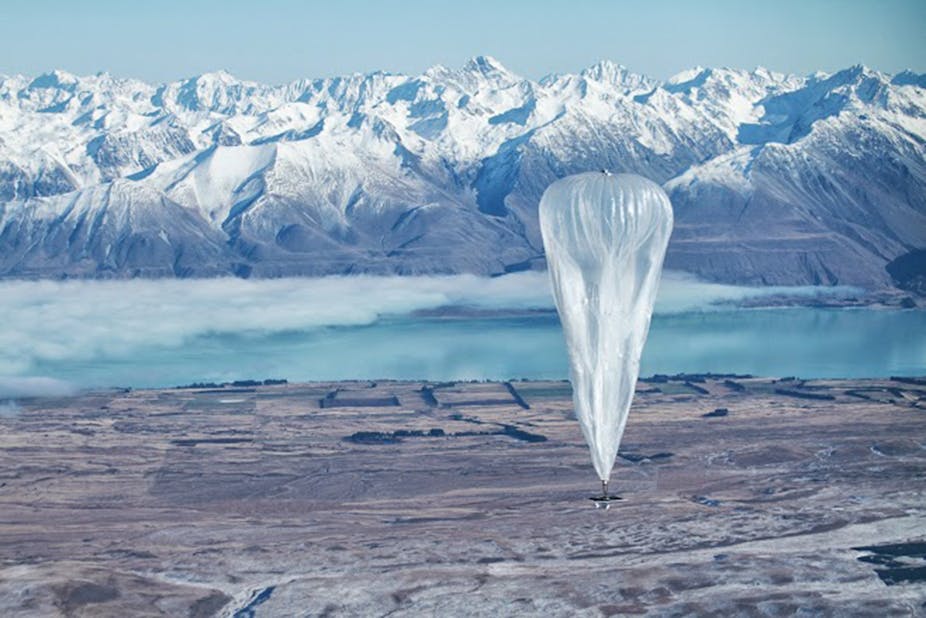The US Federal Communications Commission last month granted Elon Musk’s SpaceX permission to launch 4,425 satellites that will provide affordable high speed broadband internet to consumers.
The Starlink network will be accessible in the US and around the world – including in areas where the internet is currently unavailable or unreliable.
SpaceX isn’t the only company investing in global internet infrastructure. Facebook, Google and Microsoft all have various projects underway to deliver high speed connectivity to remote and rural areas.
It’s all part of a trend of private companies attempting to breach the digital divide and wage a battle for the global internet.
Read more: Connecting everyone to the internet won't solve the world's development problems
But entrusting market forces to build critical internet resources and infrastructure is problematic. These companies aren’t obligated to operate in the interest of consumers. In some cases their practices could serve to further entrench the existing digital divide.
Half the world’s population can’t access the internet
The internet is embedded in social, personal and economic life across the developed world.
But access varies significantly between industrialised nations that boast high per capita incomes, and developing nations with largely poor, rural populations.
For example, 94% of South Korean adults and 93% of Australian adults have access to the internet, compared with just 22% of Indians and 15% of Pakistanis.
As society becomes increasingly dependent on the internet, nations and communities need equal access. Otherwise legacy inequalities will become further entrenched and new divides will emerge, potentially creating a “permanent underclass”.
Tech giants battle it out
The tech giants have been investing heavily in critical infrastructure in recent years.
Google owns the FASTER trans-Pacific undersea cable link, which has carried data (at 60 terabits per second) between the US, Japan and Taiwan since 2016. Meanwhile, the Microsoft and Facebook funded MAREA trans-Atlantic cable has connected the US to southern Europe (at 160 terabits per second) since in 2017.
New investments centre on atmospheric, stratospheric and satellite delivery strategies.
Along with SpaceX’s constellation of small satellites, Facebook’s internet.org uses atmospheric drones to deliver internet to rural and remote areas. Google’s Project Loon uses high altitude navigable balloons for the same purpose.
The privatisation of a public good is problematic
Private investors who build infrastructure are driven by commercial imperatives rather than a need to deliver social benefits. And that dynamic can entrench and exacerbate existing – and create new – digital, social and economic divides.
This can be innocuous enough, such as when the company that makes League of Legends built its own internet network to ensure its players weren’t upset by slow speeds.
But it’s more of a problem when faster connections can tilt investment and trading playing fields in favour of those with access, leaving ordinary investors out in the cold.
Read more: How the internet is failing to drive economic development where promised
Facebook’s Free Basics is a program that aims to provide cheap internet services to consumers in developing countries. It currently operates in 63 developing nations.
Critics say the service is a blatant a strategy to extend Facebook’s global dominance to the developing world. It’s also been accused of violating net neutrality by strictly controlling participating sites to eliminate Facebook’s competitors.
Technology is not neutral
Privately owned and operated internet infrastructure can also become a means of social control.
Termination of internet services is a notorious tactic used by authoritarian regimes to repress dissent by disrupting communication and censoring information. But private entities may also exercise control over infrastructure outside of government regulation.
For example, when WikiLeaks published government correspondence in 2010, Amazon and AnyDNS withdrew the services that maintained the Wikileaks website. Mastercard, Paypal and VISA terminated services through which the organisation received funding for its activities.
These companies were not acting under government direction, citing violations of their Acceptable Use policies to justify their decisions. Harvard professor Yochai Benckler said at the time:
Commercial owners of the critical infrastructures of the networked environment can deny service to controversial speakers, and some appear to be willing to do so at a mere whiff of public controversy.
SpaceX must meet a host of technical conditions before Starlink can be activated. But we shouldn’t assume that providing internet access to developing countries will lead to an ecosystem from which economic or social benefits will flow.
When the logic of corporate capitalism dominates the provision of internet services, there’s no guarantee that the internet’s founding principles – an egalitarian tool where users share information for the greater good – will be upheld.

